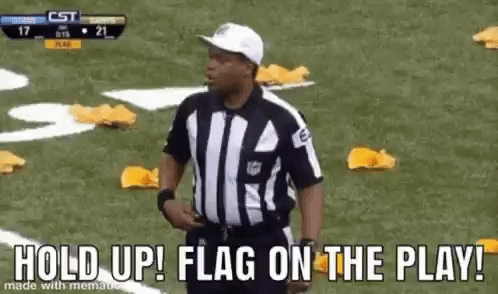When I arrived for my first work-day of 2022 this morning, I found (or finally noticed) the following meme posted in the office:
I’ve been thinking a lot over the holiday break about holding multiple ideas in tension, the necessity of interruption in dialogue, and the tendency of writing to become rhetorical, argumentative and monologic—essentially flattening and misrepresenting alternative points of view.

As with the end of year rituals of the past few weeks, I've reflected on my learning in 2021 and where I'd like to go in 2022. As this blog professes, I'm fascinated with dialogue in education—primarily with the utterance-level decisions interlocutors make on the margins of educational exercises, practices, etc. For example, I'm fascinated by the informal conversations of teachers between classrooms, the exchanges "around" the protocol of the collaborative planning meeting, and the spontaneous, improvisational question-and-answer conversation of one-to-one feedback with leaders and teachers.
In these reflections, I've considered some of the polemics I've engaged in within the last year. I've been thinking about disagreement, debate, argument, challenges, and claims or counterclaims. In my reading about dialogue and dialectic, I've noted the tendencies of dialogue to be spontaneous, contradictory, and interruptible in its essence; whereas, dialectic attempts a discursive course of reasoning through question and answer or some sort of opposition of claim and counterclaim which results in a finalized conclusion. The more I consider the (surely useful) innovations of dialectic, the more I'm convinced of its relationship to single-author rhetoric or polemic, to author-itative argument, or to monologue.
Of course, the nature of our media (i.e., blogs, Tweets, books, essays, articles, etc.—isn't it funny we don't think of "dialogue" as media?) pushes this technology of writing, this development of dialectic, this participation in monologue. Again, I'm not making a claim against the utility of monologue here, but observing some difficulties encountered when we live within a media environment wherein the dialectic monologue predominates at the expense of dialogue. I'm thinking here, now, about Ong's book "Orality and Literacy," and how much our cultures, beliefs, worldviews, etc. are influenced by the oral or literal character of our media-world.
Lots of amazing folks have pushed my thinking here, and I've begun to notice many in the education sphere make claims about desiring a "both/and" approach to meeting challenges within education:








In the above you’ll see the need for both/and formative and summative assessment, both/and consensus and dissent, and both/and inquiry-based and direct-instruction. Much of our educational debating takes an either/or approach—closed or open? direct or indirect? scripted curriculum or autonomy? These binaries obscure the complex reality of teaching and learning, and its situation and context-specific concerns.

As F. Scott Fitzgerald famously wrote: “The test of a first-rate intelligence is the ability to hold two opposing ideas in mind at the same time and still retain the ability to function. One should, for example, be able to see that things are hopeless yet be determined to make them otherwise.” My goal for 2022—among other things—is to push for dialogue and both/and within education discourse. As Nikulin points out in Dialogue and Dialectic:
Only by making the two [points of view] interact and recognize each other in dialogue does it become possible to conceive of the advantages and disadvantages of each project.
In collecting material for this blog I found the following tweet:


And, finally, some research and learning thoughts for 2022:
Figure out if there’s anyone out there researching and writing about a “dialectic mind.”
Consider reading research around building vocabulary knowledge through context—even when certain words aren’t present in the text at hand.
Temper (or develop more nuance to) my views on knowledge-rich or high-quality curricular materials.
Read up on metamodernism at the intuitive insistence of Trevor Aleo.
Consider “jobs to be done” framework as a permutation of Socratic dialogue in its power to reveal underlying beliefs.
Further examine Bakhtin on “speech genres” and “dialogic space.”
Thank you for following along on this journey!




